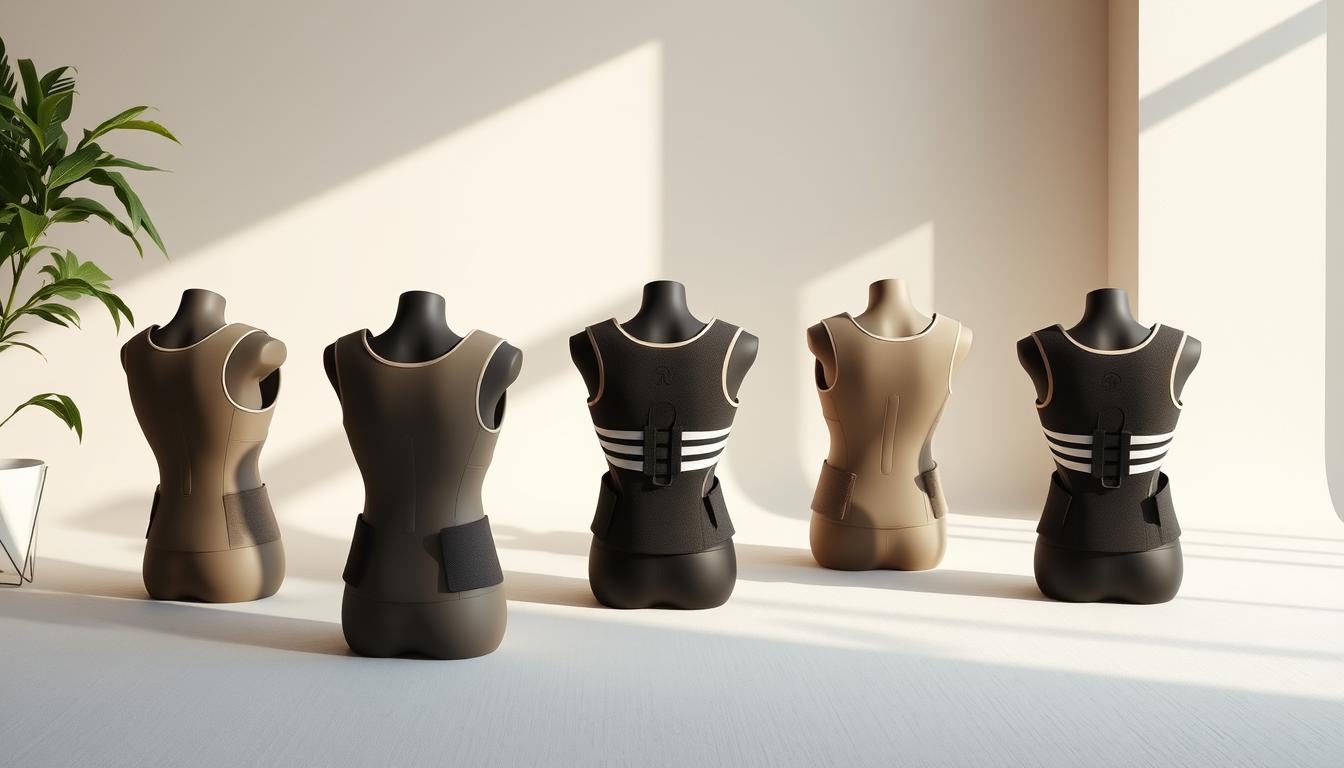Keeping good posture is hard every day. But it’s key for our health and happiness. Bad posture can cause back pain, headaches, and even lower energy and focus. Luckily, smart posture correctors are here to help, making it easier to improve our posture and live better.
In this guide, we’ll look at the best smart posture correctors. We’ll talk about their features, how they help, and why they work. If you have back pain, want better work ergonomics, or just want to stand up straighter, this article is for you. It will help you choose the right one and start your journey to better health and posture.
Introduction to Posture Correctors
Good posture is key for health and happiness. It helps avoid muscle and joint pain, boosts breathing and blood flow, and lifts your mood. Posture correctors help your body stay straight, teaching your muscles to keep good posture even without the device.
Importance of Good Posture
Bad posture can cause many problems, like back pain and headaches. But, good posture can make breathing and digestion better. It also makes you look slimmer and more confident.
Benefits of Using Posture Correctors
- Provide support and guidance for proper spinal alignment
- Train muscles to maintain good posture over time
- Improve circulation, digestion, and breathing
- Enhance overall confidence and perceived professionalism
- Reduce the risk of musculoskeletal issues and associated pain
Good posture correctors are comfy and let you move freely. They help your back stay straight. Wearing one for a bit each day can train your muscles to stay straight on their own. This is great for your posture health.
“A recent breakthrough study indicated that sitting with an upright posture can enhance coping mechanisms against stress.”
| Posture Corrector Advantages | Description |
|---|---|
| Good posture benefits | Improved circulation, digestion, and breathing; reduced risk of musculoskeletal issues; enhanced confidence and professional appearance |
| Posture corrector advantages | Provide support and guidance for proper spinal alignment; train muscles to maintain good posture over time |
Factors to Consider When Choosing a Posture Corrector
When picking a posture corrector, think about a few key things. The fit, adjustability, support, and materials are all important. They affect how well the device works and how comfortable it is.
Fit and Adjustability
The posture corrector should fit well without being too tight or too loose. It should have adjustable straps and fasteners. This lets you make it fit just right, so it supports you without getting in the way.
A good posture corrector will gently help your spine and shoulders stay in the right place. It should do this without feeling too tight or restrictive.
Support and Comfort
Good posture correctors give your back and shoulders the right support. They should spread the pressure evenly. This keeps you comfortable and helps you stay in good posture.
Look for breathable, moisture-wicking materials. These can help keep you cool and prevent skin irritation. They also let your skin breathe, which is nice.
Materials
The materials of a posture corrector are important. They affect how long it lasts, how easy it is to clean, and how it feels to wear. Choose high-quality, hypoallergenic fabrics that are easy to care for.
Stay away from materials that might cause skin problems or discomfort. This is especially true if you plan to wear it for a long time.
| Feature | Importance |
|---|---|
| Fit and Adjustability | Ensures the posture corrector provides the necessary support and comfort for your individual body type. |
| Support and Comfort | Allows the device to effectively realign your spine and shoulders without causing discomfort or restriction. |
| Materials | Contributes to the corrector’s durability, washability, and overall user experience, promoting long-term use. |
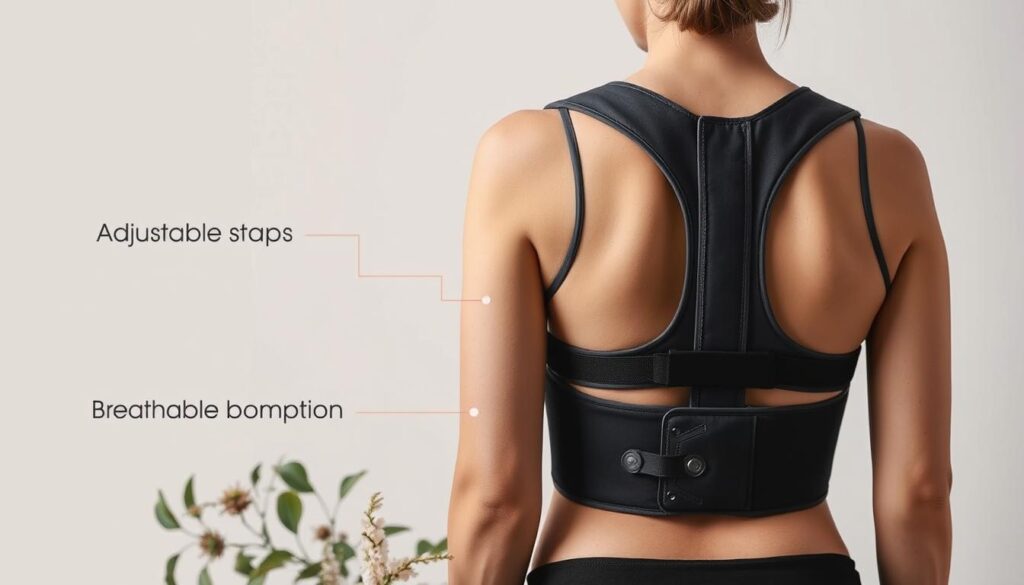
By thinking about these things, you can find a posture corrector that helps you stay in good alignment. It should also be comfortable and easy to use every day.
Posture Correctors
There are many types of posture correctors, each with its own benefits. You can find back braces, shoulder straps, wearable devices, and smart trainers. These options help people improve their posture and spinal alignment.
When picking a posture corrector, think about how long to use it. Experts say to use it for about 30 minutes a day. Using it too much can weaken your muscles and make you dependent on the brace.
It’s also good to get regular chiropractic adjustments. This helps keep your spine healthy and improves your posture over time. Using a posture corrector and getting chiropractic care together can give you the best results.
Posture correctors can also help prevent injuries from falls. They help you stand up straight, which is good for your muscles and bones. This can reduce pain and other health problems.
There are many posture correctors to choose from. You can find something that fits your needs, whether it’s a wearable device or a back brace. The most important thing is to find something that works for you and that you can wear comfortably.
| Posture Corrector Type | Key Features | Recommended Usage |
|---|---|---|
| Back Braces | Provide lower back support, improve spinal alignment | Limited to 30 minutes per day to avoid muscle weakening |
| Shoulder Straps | Gently pull shoulders back, promote upright posture | Recommended for regular, consistent use throughout the day |
| Wearable Devices | Utilize sensors to detect poor posture, provide real-time feedback | Suggested for gradual integration into daily activities |
| Smart Posture Trainers | Combine wearable technology with mobile app for comprehensive posture tracking and guidance | Encouraged for long-term posture improvement, used in conjunction with other exercises |
Exploring the different posture correctors can help you find the right one for you. This can lead to better posture, spinal health, and overall well-being.
Top-Rated Posture Corrector: Hempvana Arrow
The Hempvana Arrow Posture Corrector is a top pick for the best posture corrector. It’s lightweight and flexible, designed to gently pull your shoulders back. This helps improve your posture and reduce tension in your upper back and neck.
Features and Benefits
This posture corrector is made from comfortable hemp fiber. It’s breathable and adjustable, fitting well on your back and shoulders. The wide, padded strap design spreads out the weight, supporting you without limiting your movement. You can adjust the straps to fit your body perfectly.
Using the Hempvana Arrow is easy. It’s simple to put on and doesn’t need help, making it perfect for daily wear.
User Reviews and Feedback
User reviews for the Hempvana Arrow Posture Corrector are mostly positive. People say it’s effective in improving posture and easing back pain. Many users see a big change in their posture and comfort after just a few weeks of using it.
“The Hempvana Arrow posture corrector is a game-changer! It’s comfortable, adjustable, and has really helped me improve my posture. I notice a significant difference in my back and neck pain after wearing it regularly.”
The Hempvana Arrow Posture Corrector is a top choice for improving posture and well-being. It combines comfort, features, and positive user feedback.
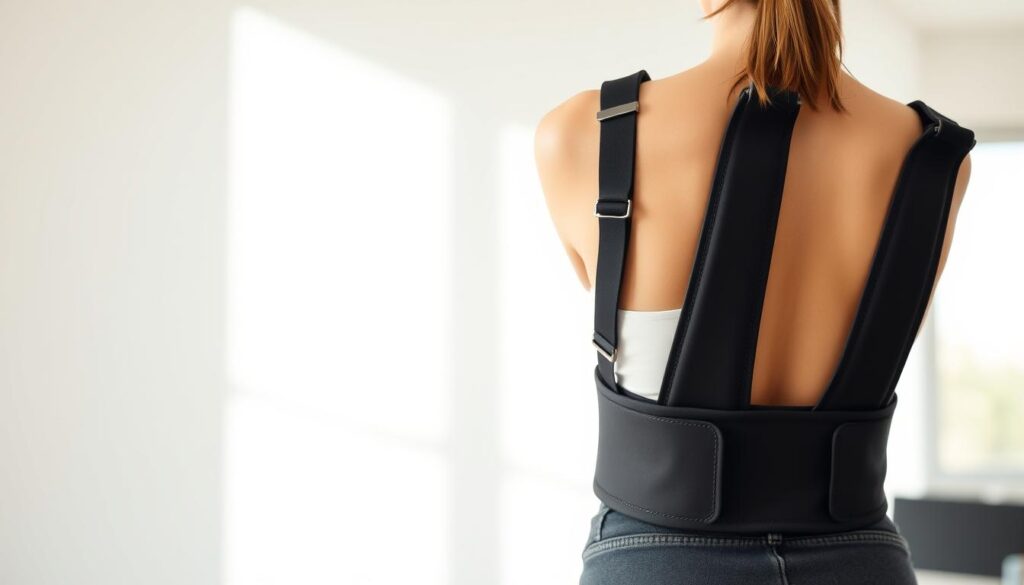
Smart Posture Trainer: Upright Go 2
The Upright Go 2 is a smart posture trainer that tracks your spinal alignment all day. It’s small and light, attaching to your upper back. It gives feedback if you slouch or move from good posture.
This device has a personalized approach. It connects with a smartphone app. You can set goals and see how you’re doing. The app also has exercises to help improve your posture and reduce back pain.
The Upright Go 2 uses gentle vibrations to remind you to stay straight. It’s very effective. Over 50% of users felt less severe pain after 18 months. And 46% said they felt better when sitting.
| Feature | Specification |
|---|---|
| Price | $64.95 (discounted from $79.95) |
| Battery Life | Up to 12 days on a single charge |
| Device Size | 1.89″ (48 mm) |
| Waterproofing | Splash-proof |
| Included Accessories | Hard travel case, USB-C charging cable, 10 adhesives |
The Upright Go 2 is backed by science. Four studies show it reduces pain and improves health. Over 500 clinics worldwide recommend it. And more than 57,000 users have seen a big drop in back pain.
If you want to fix your posture or keep it healthy, the Upright Go 2 is a great choice. It’s easy to use and can help you feel better.
Best Budget Option: Berlin and Daughter Posture Corrector
The Berlin and Daughter Posture Corrector is a great pick for those on a tight budget. It has padded, flexible straps and a breathable design. This makes it comfortable to wear and helps align your back and shoulders.
It’s priced at $24.99, down from $32.00. With 879 reviews and a high rating, it’s a favorite among those watching their wallets. It comes in sizes from XS to XXL, fitting women of all shapes and sizes.
The Berlin and Daughter Posture Corrector is known for its customer focus. They offer a simple return policy and work hard to make sure you’re happy. Plus, it has a lifetime warranty, so you can trust it will last.
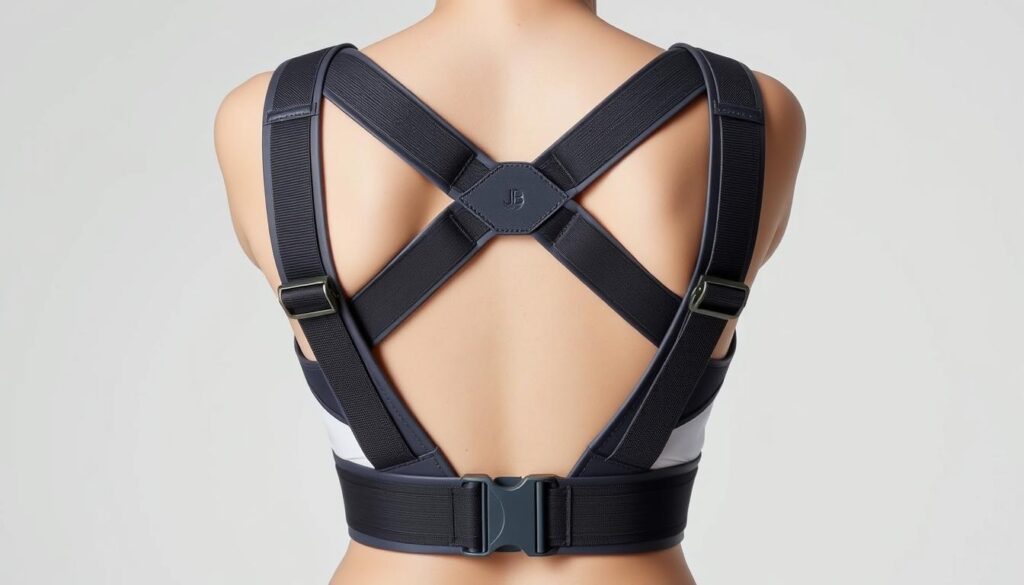
While it may not have as many customization options as pricier models, the Berlin and Daughter corrector is still a smart choice. Using it with exercises to strengthen your core and back can really help improve your posture. This way, you can fix the root causes of bad posture and see lasting changes.
Posture Corrector for Sitting: FlexGuard
The FlexGuard posture corrector is a great tool for keeping your back straight while sitting for long times. It’s made to help with the bad posture that comes from too much desk work or computer time.
Design and Functionality
The FlexGuard has padded, adjustable straps that fit your body well. They help support your lower back and keep you sitting up straight. It’s made of lightweight, breathable materials, so it’s comfy to wear all day.
User Experiences
Many people like the FlexGuard posture corrector. They say the adjustable straps and padded design help them sit better. One user said, “The FlexGuard has been a game-changer for me. It’s comfortable to wear and has really helped improve my desk posture.”
| Feature | Description |
|---|---|
| Adjustability | The FlexGuard posture corrector offers adjustable straps to accommodate a range of body types and provide a customized fit. |
| Back Support | The padded design of the FlexGuard provides targeted support for the lower back, helping to maintain proper spinal alignment. |
| Breathability | The lightweight, breathable materials used in the FlexGuard’s construction allow for comfortable all-day wear. |
Whether you’re working at a desk, studying, or doing other activities that make you sit a lot, the FlexGuard posture corrector can help. It supports your back and keeps your spine healthy.
Wearable Posture Devices: An Overview
Technology keeps getting better, and wearable posture devices are a new way to fight poor posture. These wearable posture devices use posture tracking technology to check how straight your spine is. They give you feedback right away to help you correct your posture.
How They Work
Devices like the Upright Go 2 have sensors that notice when you slouch. If you start to lean forward, the device vibrates or sends a quiet signal. This tells you to sit up straight and keep your spine aligned.
Advantages and Disadvantages
Wearable posture devices have big pluses. They let you track your progress and get tips just for you. They also help your muscles remember to stay straight, which can make your back feel better and boost your work.
But, some people might find the vibrations annoying. Also, these devices cost extra money.
| Advantages | Disadvantages |
|---|---|
|
|
Wearable posture devices are a great option for those wanting better posture and health. With the latest posture tracking technology, these smart posture correctors help you form good habits. This can make your life more comfortable and productive.
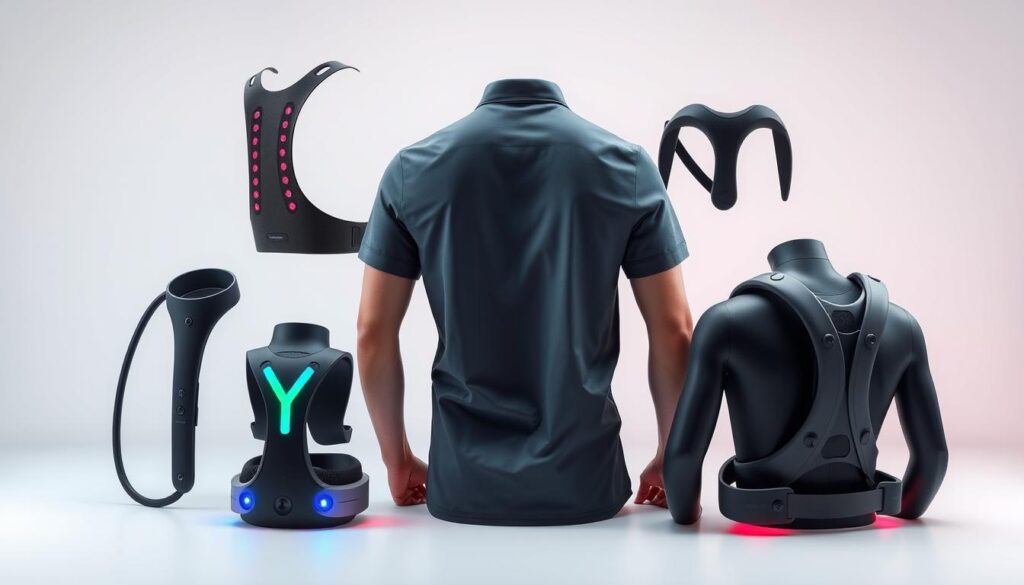
Posture Exercises to Complement Corrector Use
Posture correctors offer great support and guidance. But, adding specific exercises to your routine can boost the benefits even more. These exercises strengthen muscles in your core, back, and shoulders. They help keep your spine aligned and improve your posture.
Movements like chest openers, shoulder rolls, and back extensions are great. Using a posture corrector with these exercises creates a strong plan for better posture.
Studies show that there are many exercises to choose from. You can do 2 whole body exercises, 3 to 6 for your upper back, and 7 to 10 for your lower back and core. The “Neck Retraction” exercise is recommended for 2 to 3 sets of 10 reps. The “Standing Pull Apart” exercise suggests starting with 2 sets of 10 reps and increasing to 3 sets.
- Neck Retraction (2-3 sets of 10 reps)
- Standing Pull Apart (2 sets of 10, increasing to 3 sets)
- Kneeling Hip Flexor Stretch (10 reps per side)
- Bird Dog (10 reps, alternating sides)
- Plank (2-5 reps)
- Half Cobra Pose (10 reps)
- Doorway Stretch (3 times)
Being consistent with posture exercises is crucial. Doing posture-focused exercises for 10-15 minutes a day can greatly improve your posture and reduce back pain. By using a posture corrector and exercising regularly, you can enhance your posture and overall health.
When to Consult a Professional
Posture correctors can help improve body alignment. But, for serious posture problems, like big misalignments or chronic pain, you should see a doctor first. They can help decide if a posture corrector is right for you.
A chiropractor, physical therapist, or other qualified medical provider can assess the individual’s specific needs and recommend the most appropriate corrective device or treatment plan. Sometimes, a special posture brace or exercise plan is needed. This can fix the main issue and lead to lasting changes.
Dr. Vishal K. Verma, a chiropractor, says posture correctors are great for spinal issues like scoliosis. Dr. Brittany Ferri, an occupational therapist, adds that they help improve body awareness and muscle strength.
But, checking your posture yourself might not show the whole picture. Getting a professional posture assessment can give a clearer view of what you need. This might include a posture corrector, physical therapy, or both.
| Professional Posture Recommendations | Benefits |
|---|---|
| Personalized treatment plan | Addresses the root cause of the problem |
| Custom-fitted posture brace | Provides targeted support and alignment |
| Tailored exercise program | Strengthens and activates the right muscles |
By consulting a professional for a posture corrector consultation and assessment, you can make sure you’re doing the best for your posture and health.
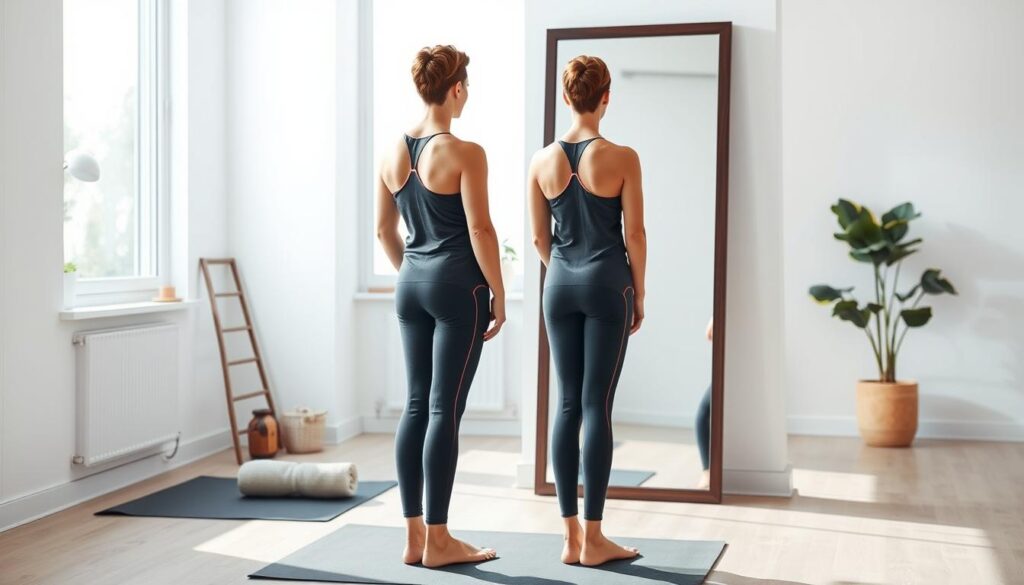
Integrating Posture Correctors into Daily Life
Adding a posture corrector to your daily routine is key for lasting results. Start with 15-20 minute sessions and increase as your body gets used to it. Remember to do posture exercises and keep your body aligned all day, even without the corrector.
Tips and Strategies
Here are some tips to make posture correctors a part of your daily life:
- Set reminders to wear the corrector at specific times, like during work or while commuting.
- Use the corrector during long sitting or standing activities, like desk work or TV time.
- Adjust your workspace to support good posture, like using a standing desk or changing your computer monitor’s height.
- Add posture exercises, like shoulder rolls and neck stretches, to your daily routine.
- Pay attention to your posture all day, even without the corrector, and adjust as needed.
By following these tips, you can develop lasting posture habits. This will improve your alignment, reduce pain, and boost your overall health.
| Posture Corrector Tips | Benefits |
|---|---|
| Start with short, 15-20 minute sessions | Allows your body to gradually adjust to the corrector |
| Pair corrector use with posture exercises | Reinforces correct alignment and muscle memory |
| Make ergonomic adjustments to work environment | Supports good posture even when not wearing the corrector |
| Be mindful of posture throughout the day | Promotes sustainable habit formation and pain reduction |
Remember, adding using posture correctors to your daily life is a step-by-step process. But the benefits of better posture, less pain, and better health make it worth it.
The Role of Posture in Overall Health and Wellness
Good posture is more than just looking right; it’s key to your health. It can boost breathing, blood flow, and digestion. On the flip side, bad posture can lead to back pain, headaches, and even affect your organs.
Research shows that proper posture aligns your head so your ears are over your shoulders, and your shoulders are back and relaxed to align your spine. It keeps your spine’s natural curves intact. Bad posture, however, can come from tight muscles or weak legs and core, leading to slouching.
Good posture does more than just make you feel comfortable. It can also lift your mood, energy, and confidence, and even lower depressive thoughts. Plus, it eases joint and bone stress, which can help prevent pain and osteoarthritis.
Fixing posture issues with devices and exercises can greatly benefit your health. It can lead to better breathing, fewer headaches, and stronger spine health. The value of good posture is clear.
“Proper posture is not just an aesthetic concern; it plays a crucial role in overall health and wellness.”

Smart Health Devices and the Future of Posture Correction
Technology is changing how we correct our posture. Devices like the Upright Go 2 use sensors and apps to help us improve our posture. These wearable health devices are leading to better spinal health and wellness.
The rise of smart posture technology is exciting. It could change how we deal with posture problems. Soon, we might use smart devices with exercise plans and real-time advice. This could help us stay in good posture and feel better overall.
These advanced wearable devices are promising for the future of posture improvement. We’re seeing new gadgets like smart trackers and ergonomic chairs. They’re all part of a growing trend towards better posture and health.
| Innovative Gadgets for Posture Monitoring | Cutting-Edge Apps for Posture Improvement |
|---|---|
|
|
“The rise of consumer health wearables is discussed in Piwek et al. (2016), where wearable devices are seen as facilitators, not drivers, of health behavior change, as noted in the study by Patel et al. (2015).”
The future of posture correction looks bright. With smart posture technology, wearable health devices, and new posture improvement tools, we’re in for a change. We’ll have a more active, data-driven way to keep our spines healthy and our bodies well.
Posture Correctors: A Comprehensive Buying Guide
Choosing the right posture corrector can change your life. It helps with back pain, looks better, and keeps your spine straight. Knowing what to look for is key.
Fit and adjustability are top priorities. Look for sizes and features that fit you well. The corrector should be comfortable and not cause irritation.
The materials matter too. Spandex, nylon, rubber, polyurethane, and cotton are common. Pick one based on how you’ll use it, like sitting or standing.
| Statistic | Value |
|---|---|
| Overall Effectiveness Ratings | 92% to 99% |
| Comfort & Fit Ratings | 88% to 98% |
| Quality Ratings | 94% to 97% |
| Value Ratings | 93% to 95% |
| Price Range | $13.49 to $350.00 |
Always talk to a healthcare professional for serious posture issues. They can help pick the best device for you. This way, you get a solution that works for your needs and improves your health.
“Good posture offers health benefits such as pain relief, improved appearance, increased confidence, better exercise form, reduced injury risk, more energy, and enhanced mobility.”
In conclusion, understanding what to look for in a posture corrector is important. With the right guidance, you can find a solution that meets your needs and improves your health.
Conclusion
Using posture correctors can greatly improve your health and well-being. They help train your body to keep the spine straight. This reduces pain and discomfort from slouching or hunching.
When choosing a corrector, look at fit, support, and adjustability. Adding posture exercises to your routine can make a big difference. This way, you can enjoy better posture every day.
A study on 88 students showed posture correctors work well. The students did exercises for 20 minutes, three times a week for eight weeks. These exercises helped straighten their bodies and reduce back pain.
Technology is making posture correction even better. Soon, we’ll have tools that fit our needs perfectly. Using these tools can make you stand taller and feel better.
By focusing on good posture, you can boost your health and energy. The key takeaways on posture improvement and the posture corrector summary highlight the benefits. They show how important it is to correct poor posture for your health.

